I Credit Retinol Body Lotions For Tightening and Firming My Crepey Skin
These 17 are my editor-vetted favorites.


While facial skincare gets a lot of attention, the rest of the body is often neglected in comparison, and many people go about their days and nights without using a quality body lotion, among other noteworthy body care products. Luckily, there are many products to choose from, including hydrating moisturizers, body serums, and in-shower exfoliators—but my personal favorite body skincare routine item is one of the best retinol body lotions.
"Retinol is a vitamin A derivative that is available over the counter in a variety of formulations, including serums, creams, eye creams, and more," says board-certified dermatologist Lauren Penzi, MD. Most consumers are aware of the acne-fighting, skin-renewing properties on the face, but using retinol from the neck down poses similar benefits.
"It helps to boost collagen production, may help with blemishes and discoloration, can be used for rough and bumpy skin, and may also help with stretch marks," says board-certified dermatologist Marisa Garshick, MD at MDCS Dermatology.
Incorporating a retinol body cream into my personal care routine has mitigated my back acne, calmed the keratosis pilaris on my arms, and even lessened the appearance of old scars. I've tested my fair share and am bringing you the 17 best retinol body lotions to try adding to your routine.
The Best Retinol Body Lotions
- Best Retinol Body Lotion Overall: Naturium Retinol Body Lotion
- Best Firming Retinol Body Lotion: Josie Maran Whipped Argan Pro-Retinol Body Butter
- Best Retinol Body Lotion for Acne: Paula's Choice Resist Retinol Skin-Smoothing Body Treatment
- Best Retinol Alternative Body Lotion: Sol de Janeiro Beija Flor Collagen-Boosting Elasti-Cream
- Best Retinol Body Lotion for Hyperpigmentation: Mutha Body Butter
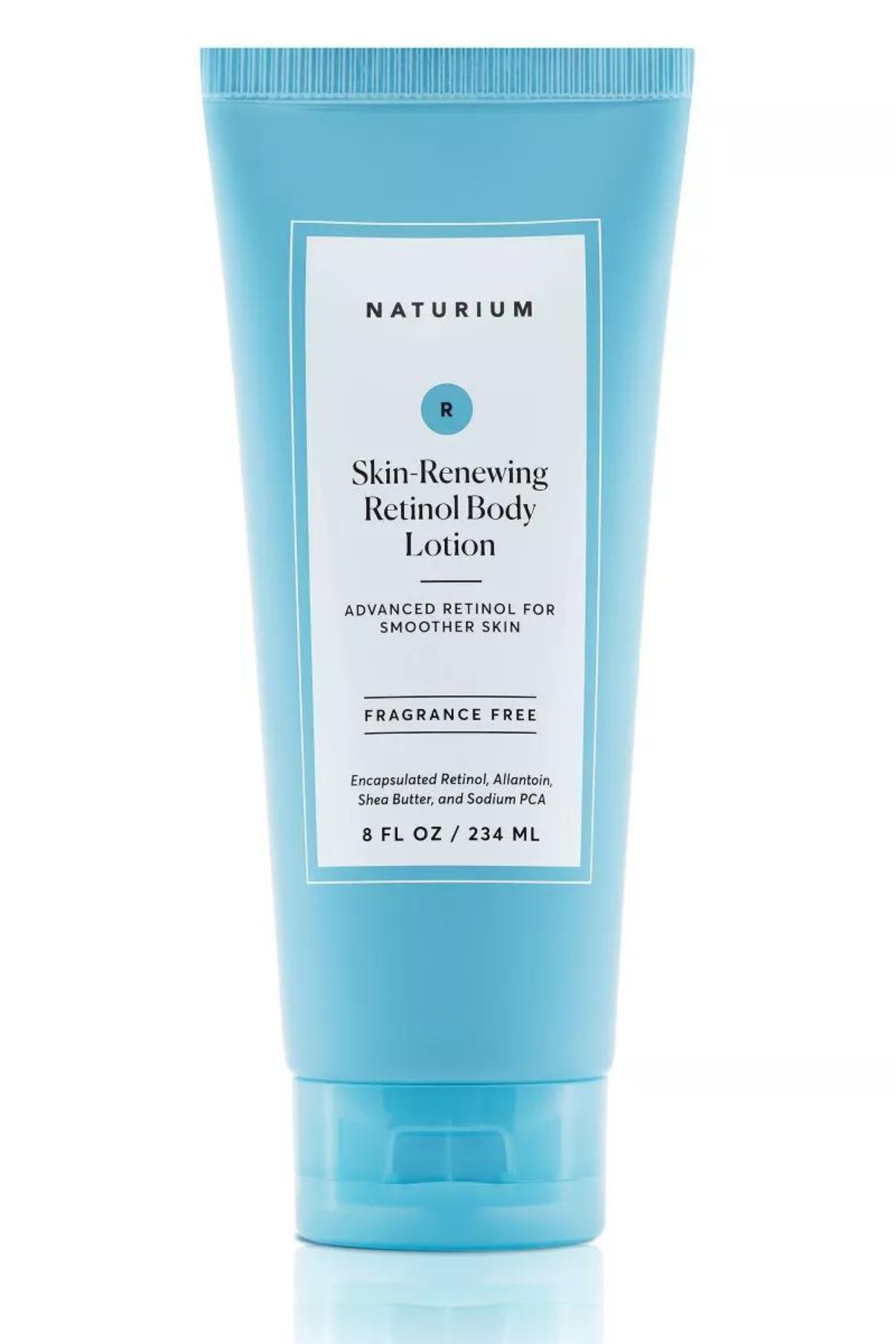
Naturium’s retinol body lotion has received rave reviews, with customers swearing that the cream improved every condition from acne and crepey skin to hyperpigmentation. I've found that the formula isn’t too thick and doesn’t leave skin feeling oily or sticky. On the flip side, it also doesn’t dry skin out, even after consistent, frequent use, and features a fragrance-free formulation to avoid irritating sensitive skin.
Size: 8 fl. oz
Key Ingredients: Glycerin (hydration and moisture); Water (hydration); Shea butter (soothing and nourishing)
What I Love: Vegan; Cruelty-free; Affordable; Clean; Free of parabens, gluten, and fragrance
What I Don't: Slightly medicinal scent
Review for MC: "Not only is this lotion readily available at most drugstores and online retailers, but it also feels like butter on the skin, which is why it tops this list as the best retinol body lotion overall. It's easy to use, sinks into the skin (and leaves behind a moisturized glow!), all while providing smoother-looking skin within just a few weeks of use. A true 10/10 product." — Ariel Baker, Beauty Writer
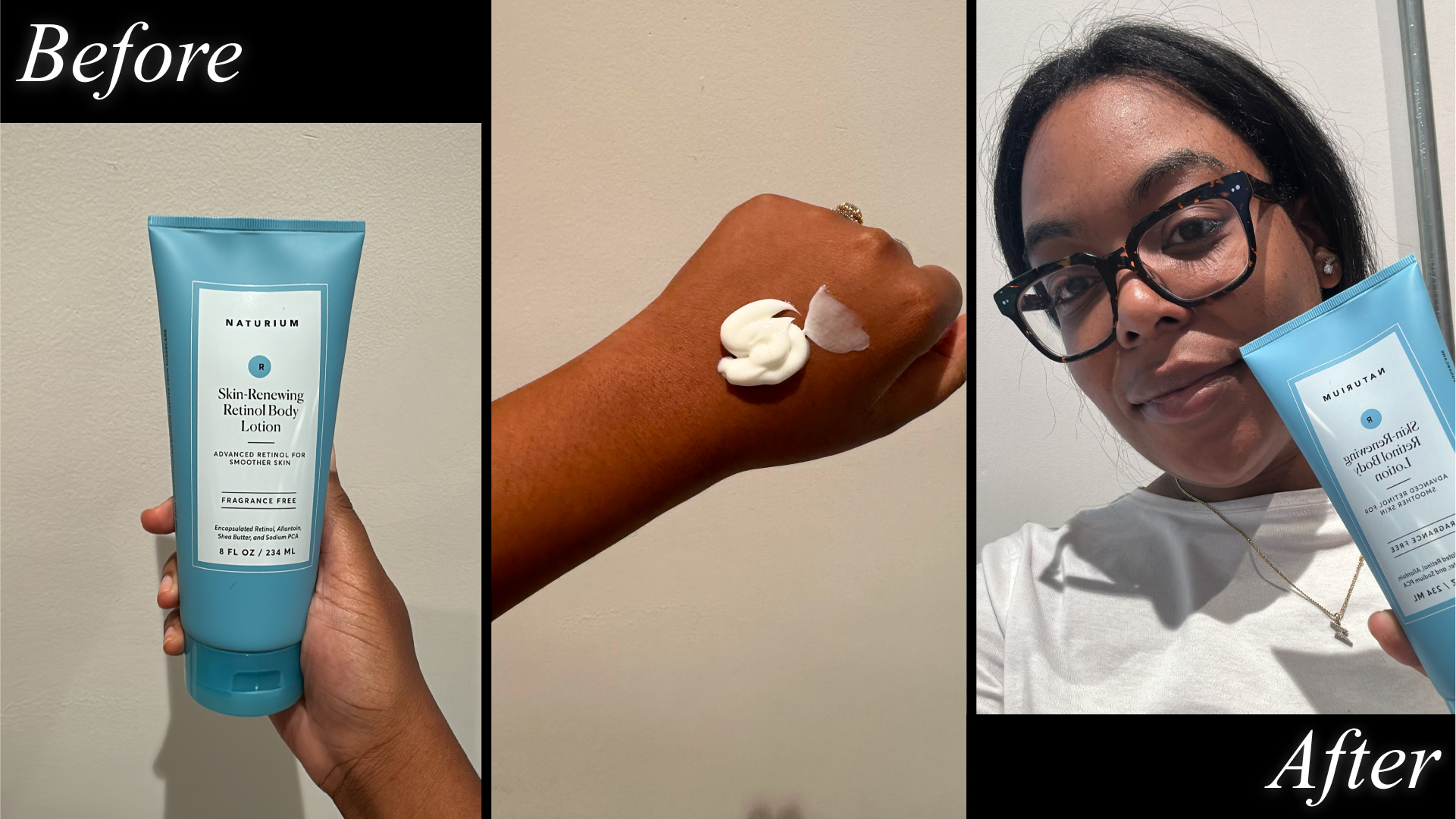
Ariel Baker testing Naturium's Retinol Body Lotion.
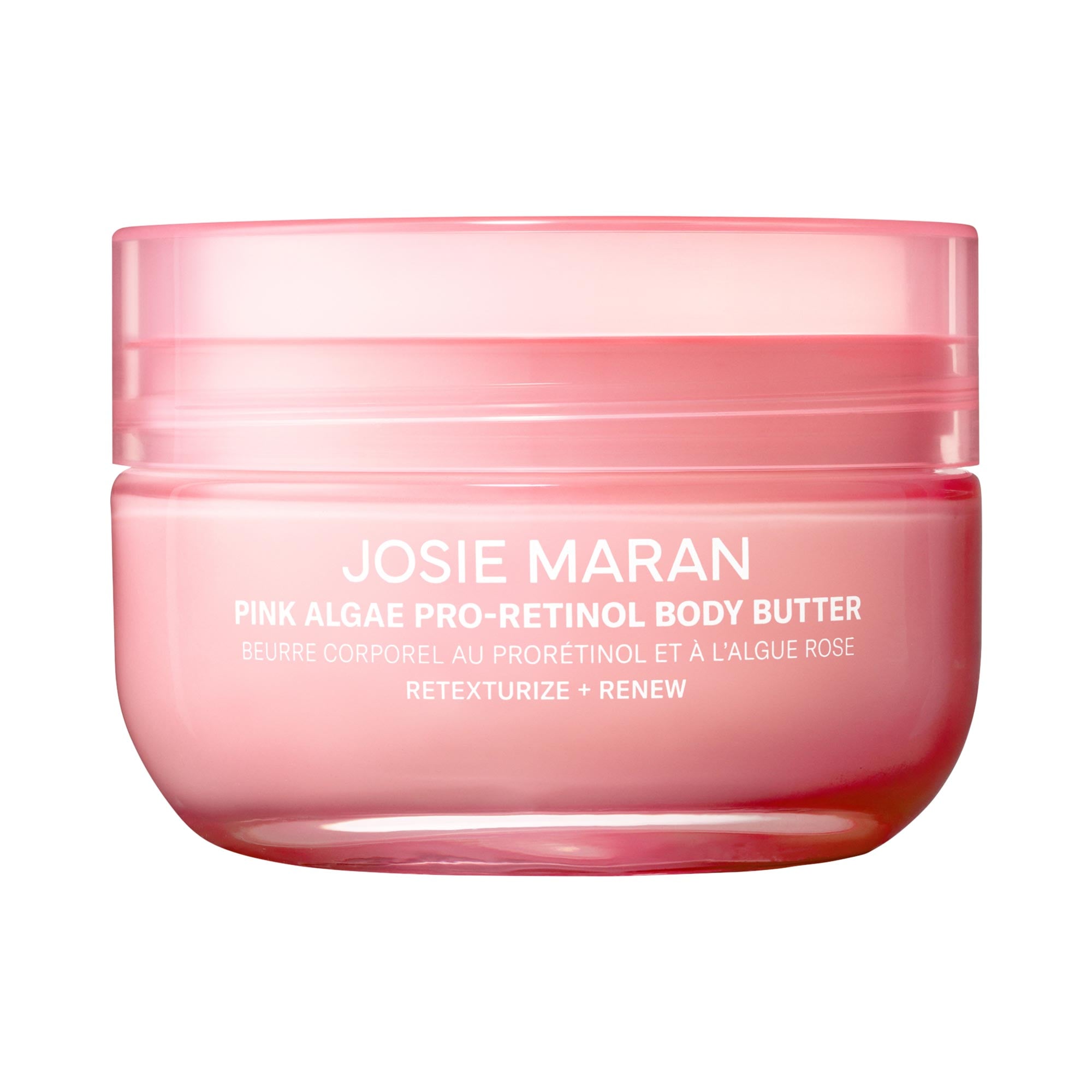
According to customers, this body butter from Josie Maran (the brand famous for its Argan oil formulas) feels smooth and rich to the touch, yet it doesn’t make skin feel greasy or sticky upon application. While the container it comes in is small, a little goes a long way, and users with keratosis pilaris report fast, noticeable results. The clean, sweet-smelling formula also contains 100 percent pure argan oil, which conditions skin and prevents the potent retinol from causing dryness, redness, or peeling.
Size: 6 fl. oz
Key Ingredients: Argan oil (improves skin elasticity); Quercetin (antioxidant); Pink Algae-Derived Pro-Retinol (a gentle form of vitamin A)
What I Like: Clean; Cruelty-free; Refillable Jar
What I Don't: It smells a little salty
Review for MC: "If you're familiar at all with Josie Maran's regular line, then you know that this retinol body butter has an elite formula. I don't know if this is a placebo effect, but it kind of smells like saltwater to me (likely due to the algae), however, that doesn't stop it from melting into the skin beautifully and leaving behind a gorgeous glow. The smell goes away in seconds, but what's left behind is glossy skin that screams: 'I drink appropriate amounts of water every day'." — Ariel Baker, Beauty Writer
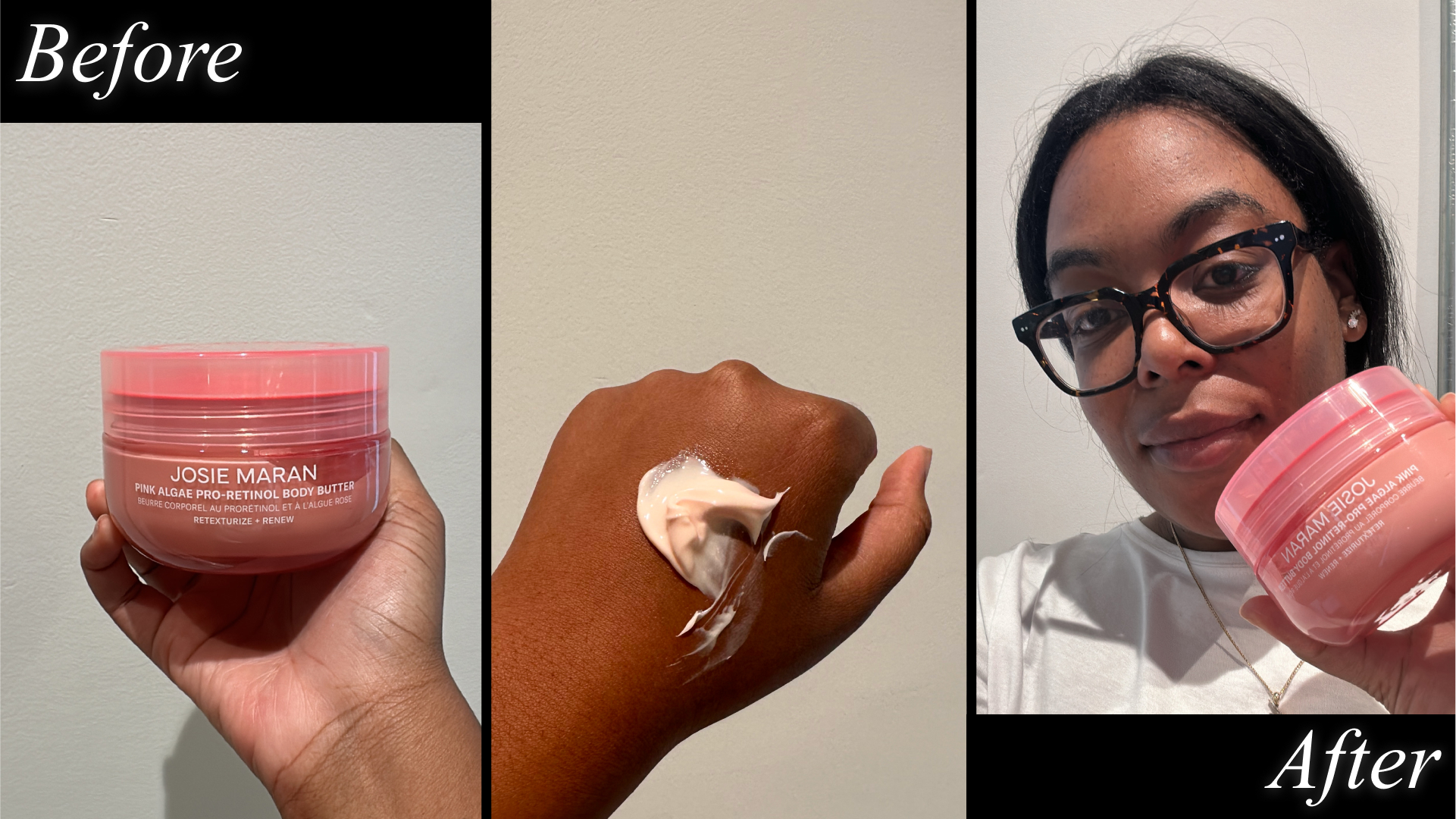
Ariel Baker testing Josie Maran's Pink Algae Pro-Retinol Body Butter.
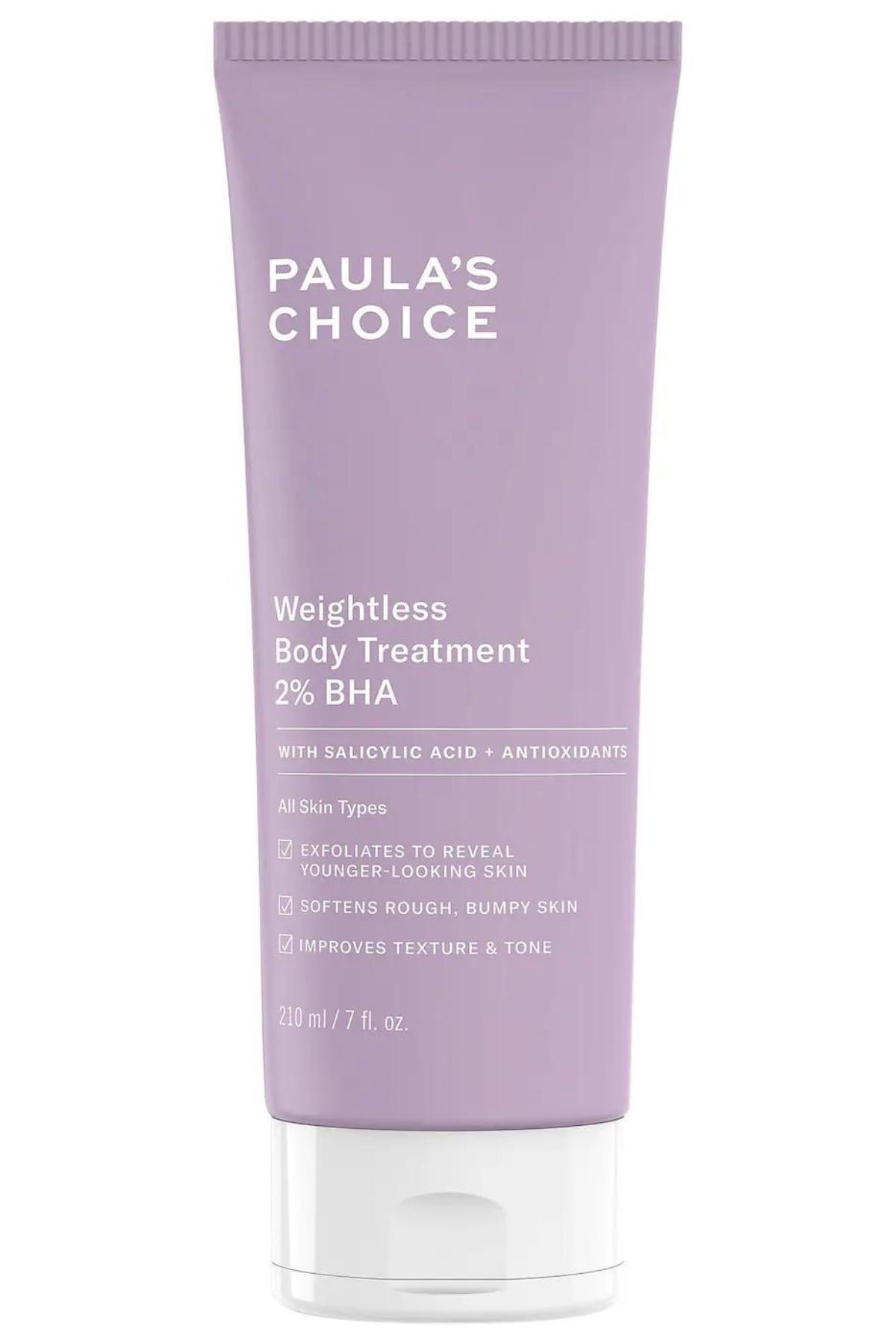
If you suffer from hyperpigmentation, uneven texture, or body acne, treat yourself to this lotion from Paula’s Choice, which contains both BHA and salicylic acid. “This product contains a moderate concentration of both antioxidants and retinol," says Dr. Penzi. "It is great to improve the texture and tone of the skin.” Reviewers agree, writing that with consistent use, this lightweight treatment lessens the appearance of hyperpigmentation and scarring (particularly from shaving) and relieves acne on the back and butt.
Size: 7 fl. oz
Key Ingredients: Salicylic Acid (chemical exfoliant that helps to break down buildup); Vitamin E (softens skin); Butylene glycol (hydration)
What I Love: Good for acne; Expert-approved; Good for hyperpigmentation and scarring; Lightweight
What I Don't: Not good for those with sensitive skin
Review for MC: "This lotion is fantastic for people who prefer a more lightweight option that can also be used on the face. It's particularly wonderful for texture, but it's a fantastic secret weapon to keep in your arsenal if you have body acne or hyperpigmentation." — Ariel Baker, Beauty Writer
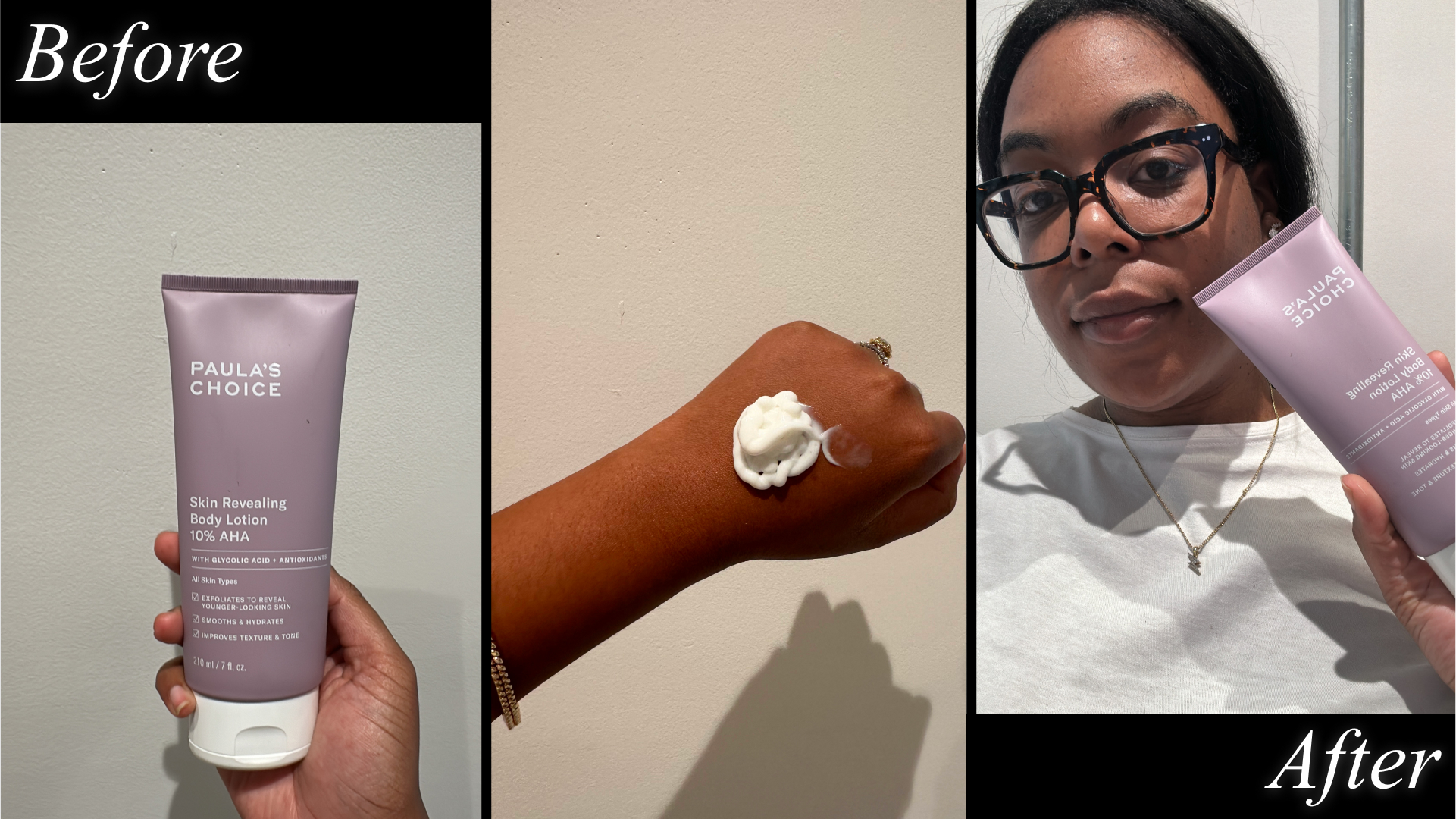
Ariel Baker testing Paula's Choice Resist Retinol Skin-Smoothing Body Treatment.
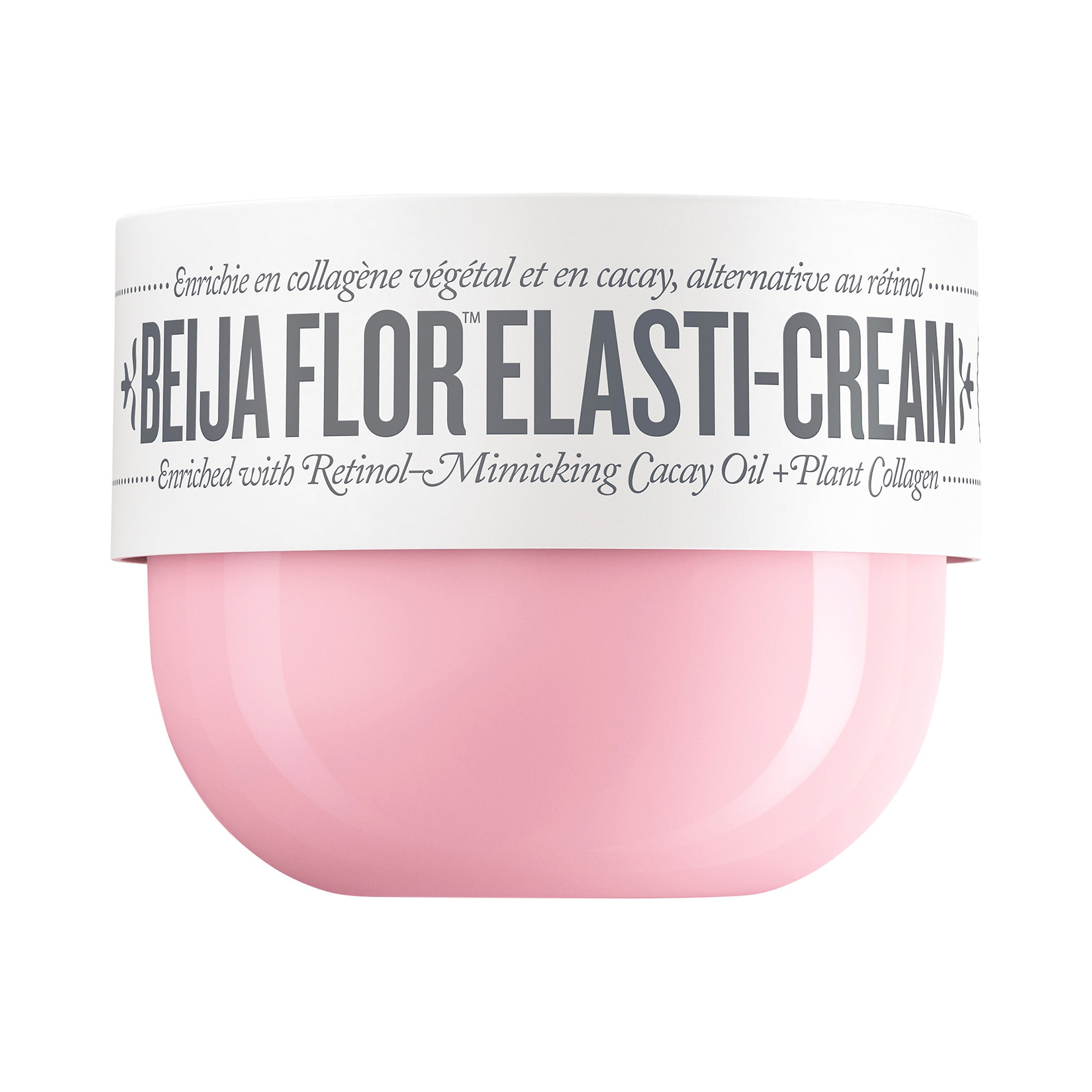
If you fear retinol is too strong or irritating, consider this option from Sol de Janeiro. It contains cacay oil and plant collagen, which mimic retinol's firming effects without any peeling or sun sensitivity. Plus, like all Sol de Janeiro products, it has a soft scent that can pair well with a pre-existing fragrance routine.
Size: 8 fl. oz
Key Ingredients: Cacay oil (natural retinol alternative); Vegan squalane (deep hydration); Vegan collagen (firmness and elasticity)
What I Love: Retinol alternative; Gentle; Firming properties; Hydrating; Soft floral scent
What I Don't: Scent may not be for everyone
Review for MC: "This formula is perfect for people with sensitive skin, who also don't mind a little fragrance in their lotions. Sol de Janeiro's Beija Flor smells light and airy, but provides similar results to traditional retinol body lotions, except with vegan active ingredients." — Ariel Baker, Beauty Writer
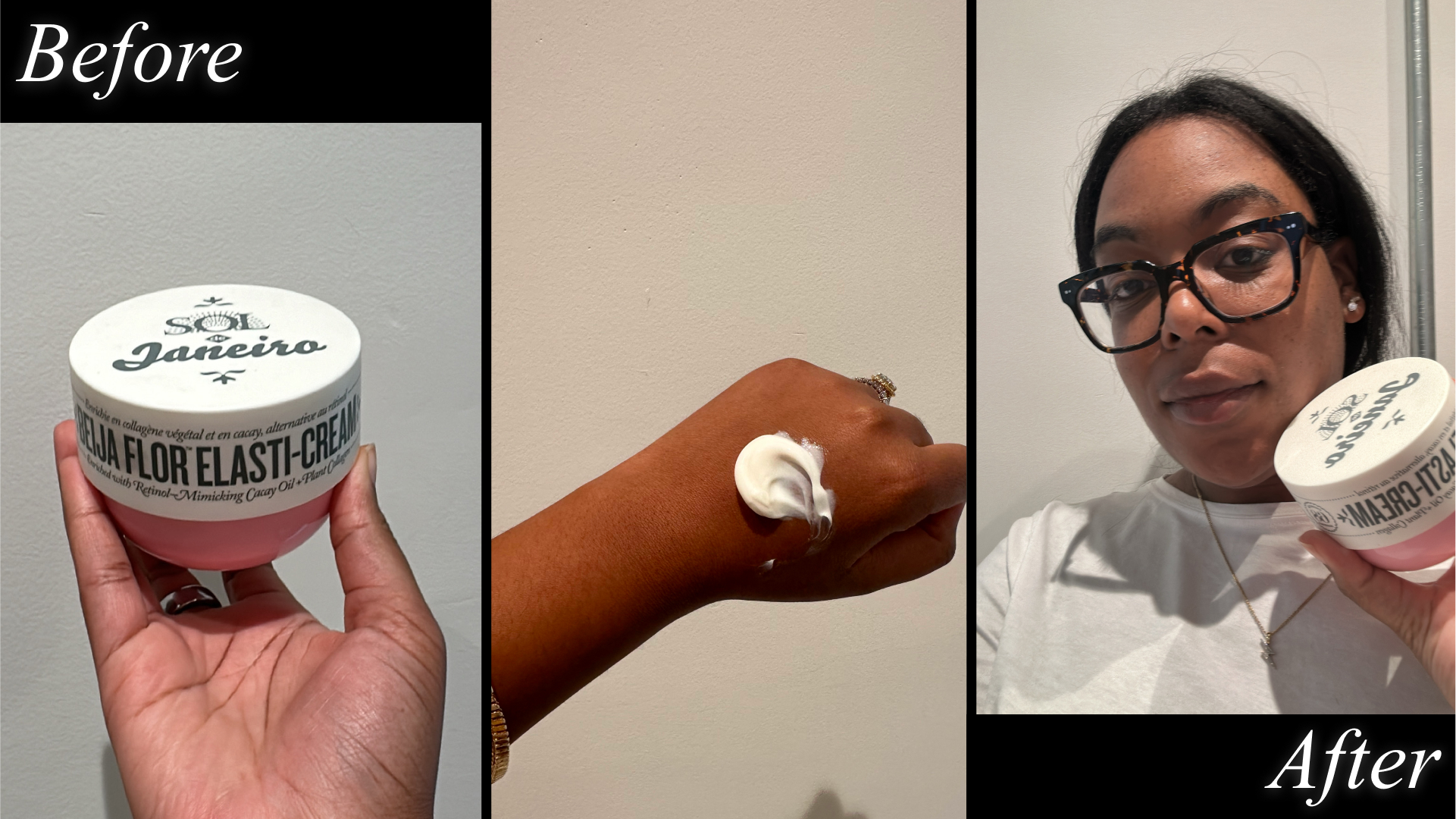
Ariel Baker testing Sol de Janeiro's Beija Flor Elasti-Cream.
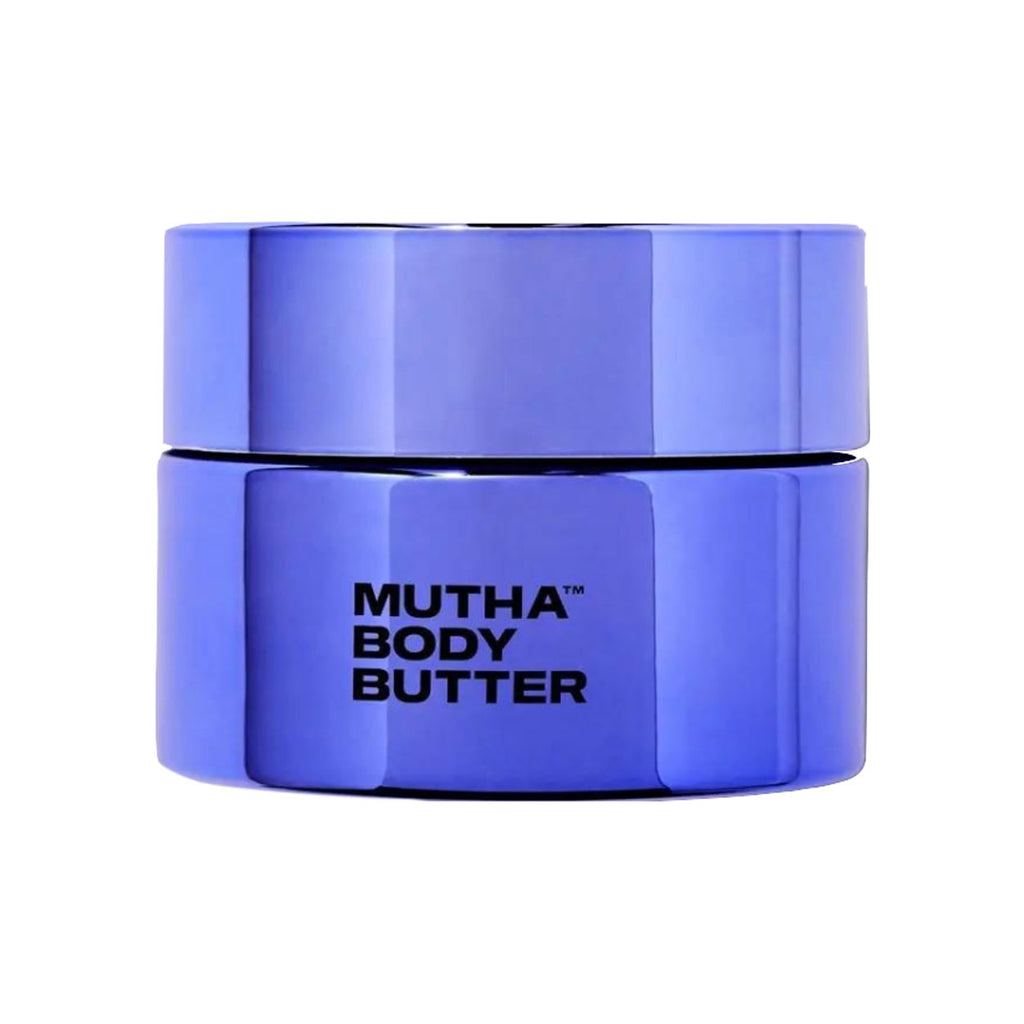
This might just be my favorite lotion of all time. I love melting this body butter in my palms and spreading it on the driest parts of my skin. A little goes a long way with this lotion, and when it settles, it has a luxurious oil-like consistency that immediately alleviates any itching or aggressive dryness. Over time, it even helps fade scars. Plus, because its vitamin A-infused formula is balanced with ingredients like shea butter, mango seed butter, and avocado oil, I can spread it on my just-shaved legs without burning or discomfort.
Size: 5.5 oz
Key Ingredients: Vitamin A/retinol (anti-aging); Mango seed butter (moisture); Shea Butter (soothing and nourishing)
What I Love: Editor-approved; Long-lasting hydration; Good for scarring and hyperpigmentation; Pregnancy-safe
What I Don't: Rich formula takes some time to absorb into the skin
Review for MC: "It's not uncommon to have to add an oil on top of your lotion to get that coveted red-carpet-inspired glow, but with this body butter from Mutha, two steps are combined into one. This formula floods my skin with moisture while leaving behind the most delicious glow, allowing me to look and feel super moisturized without loading up on multiple products and potentially overwhelm my skin. It's been a staple in my collection for years, and I don't ever see it leaving." — Ariel Baker, Beauty Writer
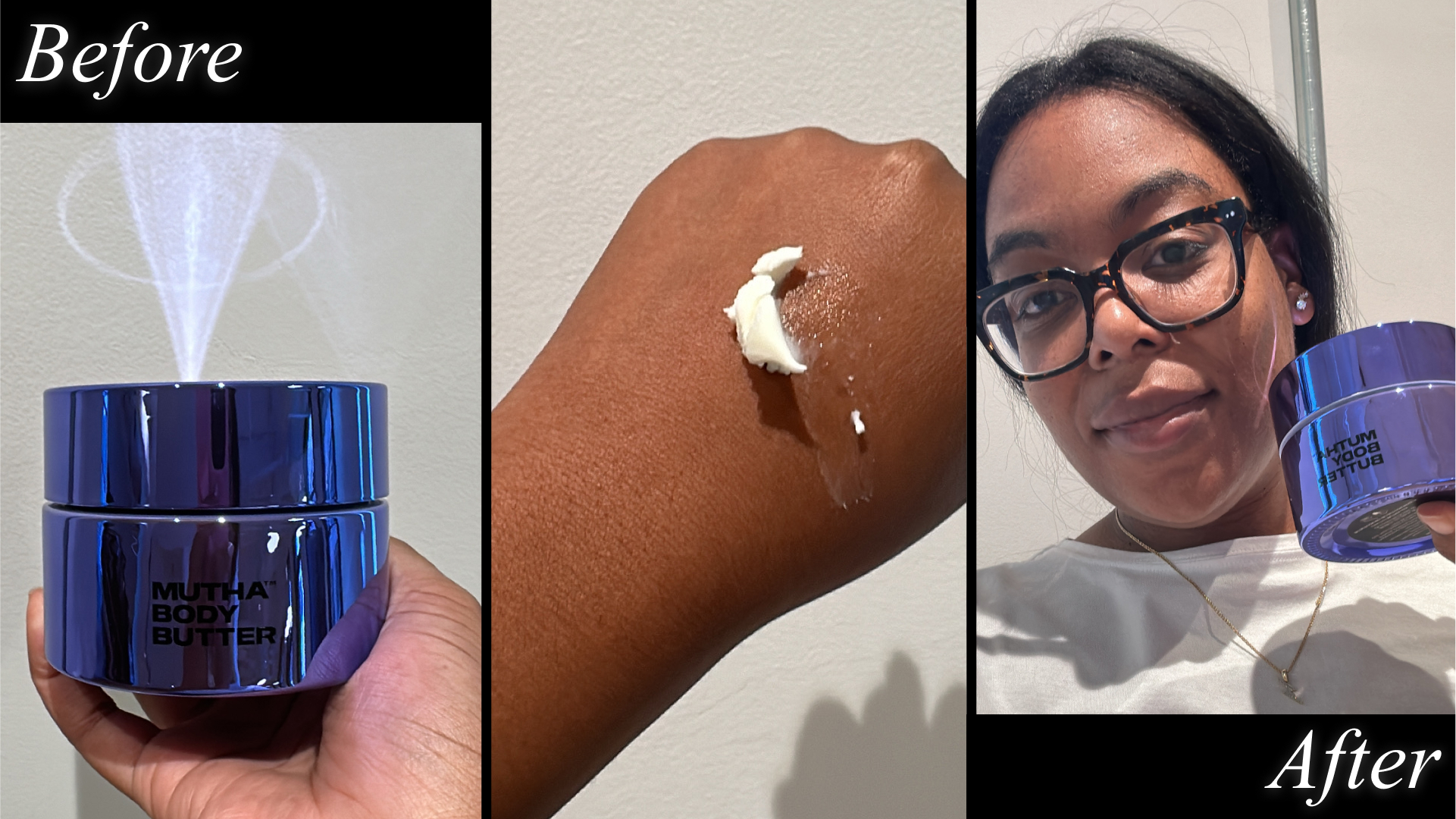
Ariel Baker testing Mutha Body Butter.
Other Retinol Body Lotions I Love
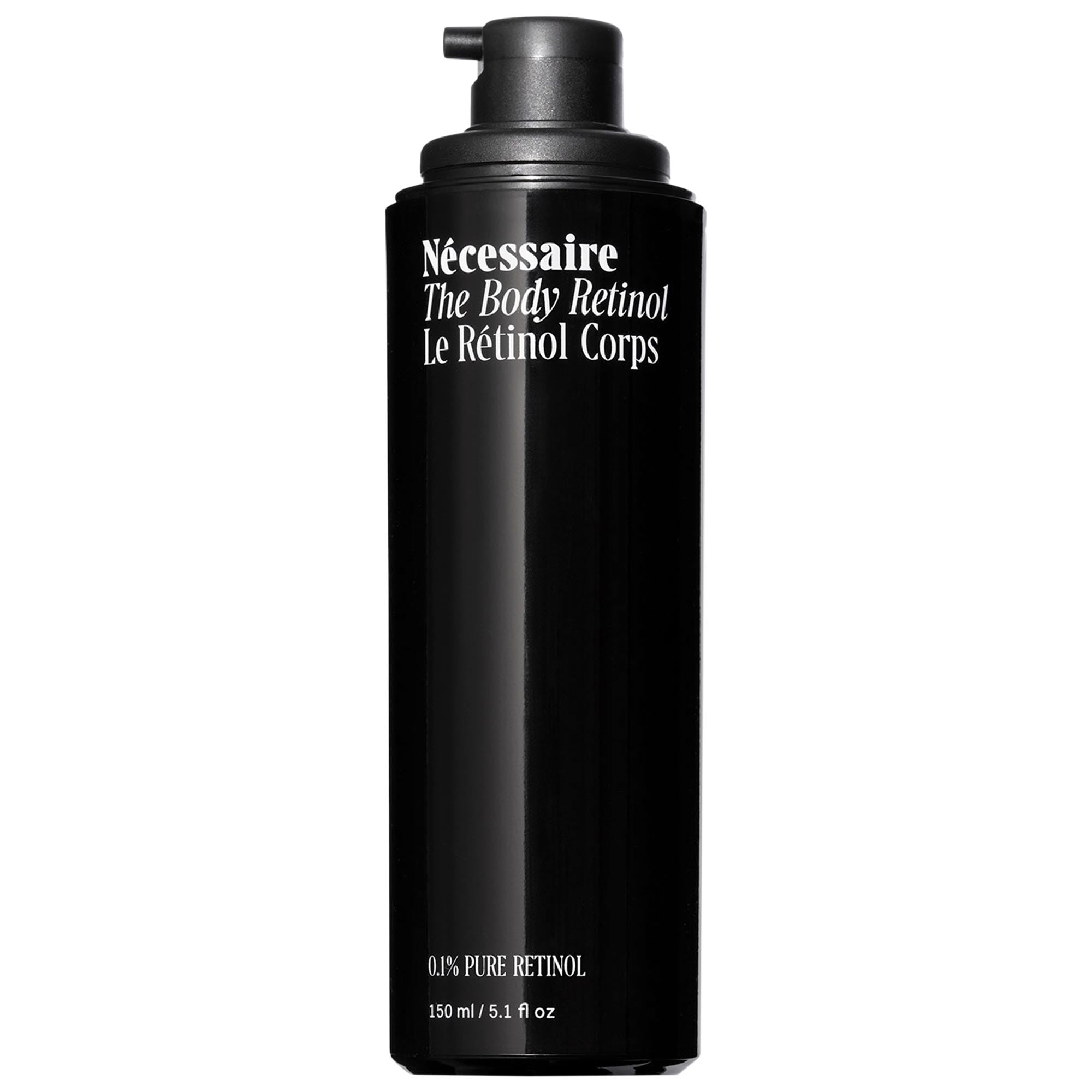
Lightweight and easy to apply (thanks to its handy pump packaging), this product is ideal for anti-aging and evening skin tone, alleviating body acne, and lessening the appearance of scars. It’s been vetted by dermatologists, resulting in a clean, hypoallergenic formula that works on all skin types. It features ultra-hydrating glycerin so that you don’t end up dried out. Dr. Camp loves it, too. "Made with 0.1 percent retinol, alpha-hydroxy acids, and peptides, this body lotion helps target crepiness, lines, and wrinkles," he adds.
Size: 5.1 fl. oz
Key Ingredients: Glycolic Acid (exfoliation and anti-aging); Mandelic Acid (brightening); Peptides (strengthen skin barrier)
What I Love: Vegan; Clean; Expert-approved; Editor-approved
What I Don't: Some users dislike the smell
Customer Review: "I was apprehensive due to the price, but this works! To me, it has a very faint, almost 'medicinal' scent, but nothing that would overpower a body butter. I use this and then follow up with my Josie Maran body butter. Within a week, it had almost completely faded the hyperpigmentation I had from my thighs rubbing, and it's been slowly working on my KP. It's now been 3 weeks and I use it every other day." — Sephora
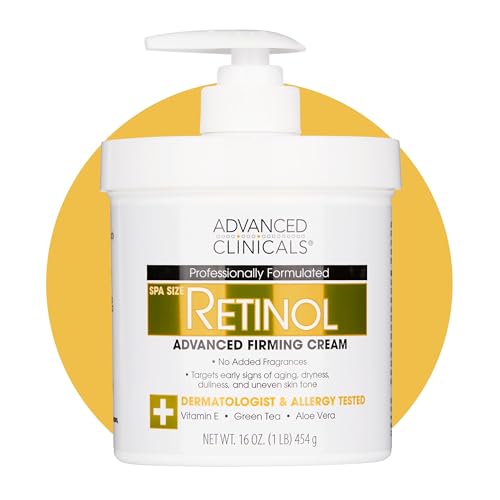
This affordable option, with its unisex packaging and fragrance-free formula, is perfect for sharing with your partner or family. It absorbs into the skin quickly without any oily or sticky feel. The tub, which weighs in at an impressive 16 ounces, lasts for ages, particularly since a little goes a long way. Plus, the cream contains ingredients like chamomile, aloe vera, and green tea extract, which soothe existing irritation and prevent further dryness or inflammation.
Size: 16 oz
Key Ingredients: Aloe vera (calms irritation); Vitamin E (protects skin); Green tea (antioxidant)
What I Love: Affordable; Contains skin-calming ingredients; Free of fragrance
What I Don't: Bulky packaging
Customer Review: "Have only used this cream for three days, but am already loving it! Is a nice consistency and goes on smoothly; absorbs quickly with no sticky residue. An ever-so-faint scent. Have used on face, arms, legs, and feet. No noticeable change in skin texture yet, but leaves skin feeling smoother. Appreciate the size of the container for the price, and the pump gives out just the right amount. Have never used this skin care brand before, but am now eager to try some of their other products." — Amazon
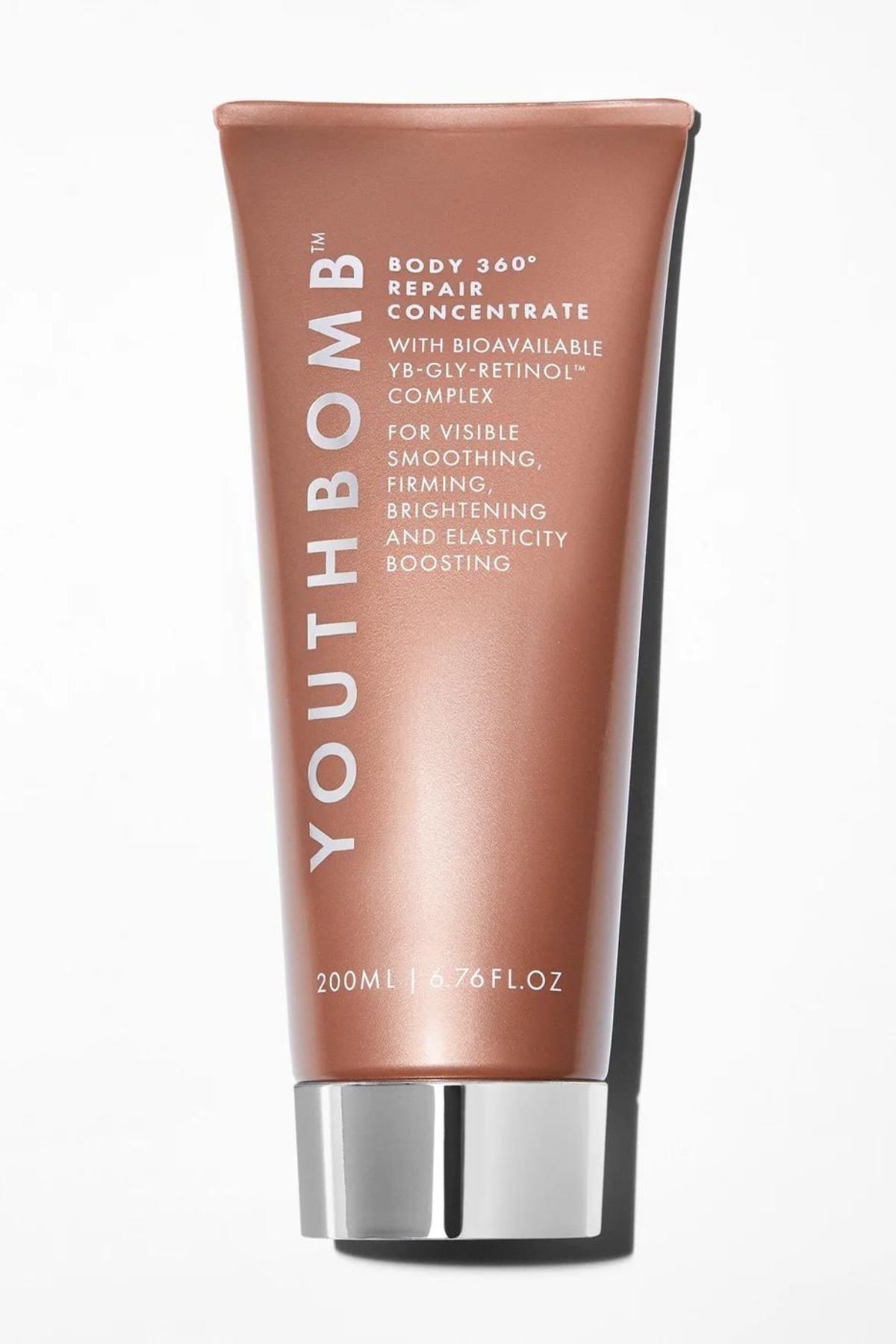
"This body lotion uses a YB-GLY-Retinol Complex to help firm the skin and improve elasticity," says Dr. Garshick. "It is formulated with granactive retinoid and exfoliating acids to brighten the skin, but is also supported by soothing oils and moisturizing butters to minimize irritation."
Size: 6.7 fl oz
Key Ingredients: Niacinamide (brightening); Glycolic acid (exfoliant); Shea butter (soothing and nourishing)
What I Love: Expert-approved; Brightening; Non-irritating; Improves skin elasticity
What I Don't: Need to sign up for a Beauty Pie membership to get the reduced price ($44 vs. $74)
Customer Review: "Really works...will be buying another and changing face skincare to this range" — Beautypie
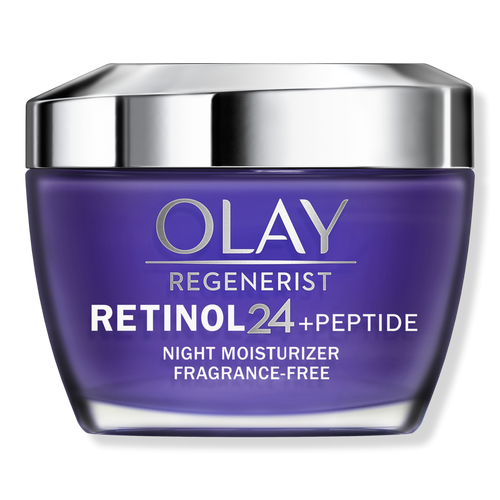
Board-certified dermatologist Divya Shokeen, M.D. loves this formula and recommends it because it is "known for its fast-absorbing and non-greasy formula. It provides hydration and retinol benefits, and is suitable for overnight use to reveal smoother skin."
Size: 1.7 oz
Key Ingredients: Niacinamide (brightening); Glycerin (hydration and moisture); Water (hydration)
What I Love: Expert-approved; Hydrating; Suitable for sensitive skin
What I Don’t: Formula is too thick for some users
Customer Review: "Amazing inexpensive retinol that does the job of a very expensive product. Love how it makes my skin look and feel the next morning." — Ulta
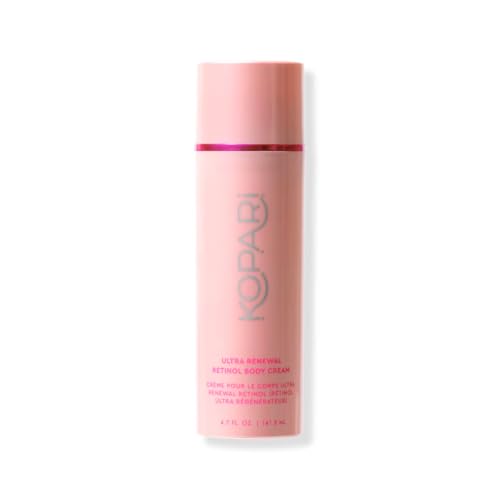
I love Kopari Beauty for their lightweight sunscreens, so I was over the moon to discover that the brand also carries a retinol body lotion. "The retinol in this product is encapsulated, meaning that it is gradually released for improved tolerability and stability," says Dr. Camp. Reviewers especially love the impact it has on loose skin.
Size: 4.7 fl oz
Key Ingredients: Aminobutyric acid (boosts elasticity); Pomegranate extract (antioxidant, which helps stop premature aging); Acai (softens skin)
What I Love: Expert-approved; Lightweight; Great for beginners to retinol
What I Don’t: Can be hard to track down
Customer Review: "There is no scent to this, which I love! This lotion keeps my skin smooth and silky. I love the way it feels, and it's not greasy at all! Highly recommend" — Kopari
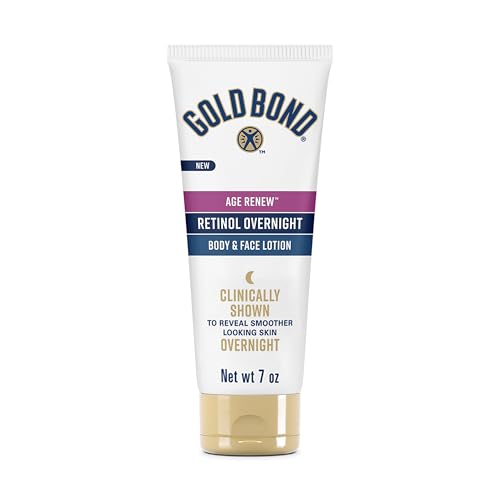
When you need an affordable option that still gets the job done, Dr. Penzi says to consider this formula from Gold Bond, which is gentle enough to be used on both the body and face. “This product contains a powerful Retinol and Peptide Complex that exfoliates to support the skin's renewal process,” she shares. “It is also nourishing and hydrating, which helps to avoid any potential irritation.” Free of fragrances and dyes, it’s also ideal for anyone with sensitive skin.
Size: 7 oz
Key Ingredients: Shea butter (soothing and nourishing); Hydroxyethyl urea (hydrating and moisturizing); Glycerin (hydration and moisture)
What I Love: Expert-approved; Affordable; Works on body and face; Fragrance-free
What I Don’t: Some users find the formula too rich
Customer Review: "An excellent lotion for the price. You don't need to use a lot, so it lasts a long time. In addition, it helps soothe my skin when it feels dry or irritated." — Amazon
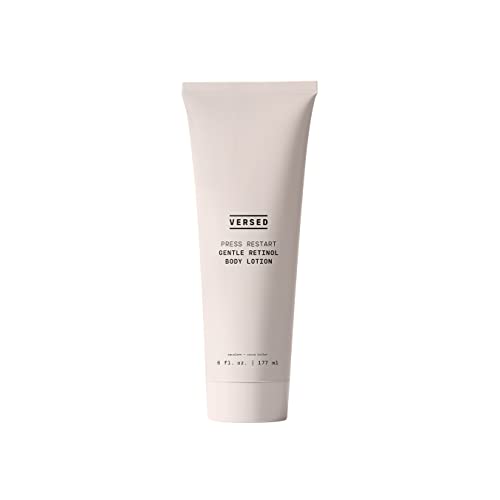
Dr. Garshick stands by this affordable option from Versed. She explains, "This lotion works to improve texture and reduce dullness in the skin. It also incorporates cocoa butter and squalane to help lock moisture in."
Size: 8 fl. oz
Key Ingredients: Squalene (hydrating and moisturizing); Cocoa butter (hydrating and anti-aging); Vitamin E (protects skin)
What I Love: Expert-approved; Affordable; Brightening; Moisturizing; Cruelty-free
What I Don’t: Some users find it too streaky
Customer Review: "Almost all of the rough/bumpy areas on my arms and knees are gone. My skin is very smooth and soft. Love this product!" — Target
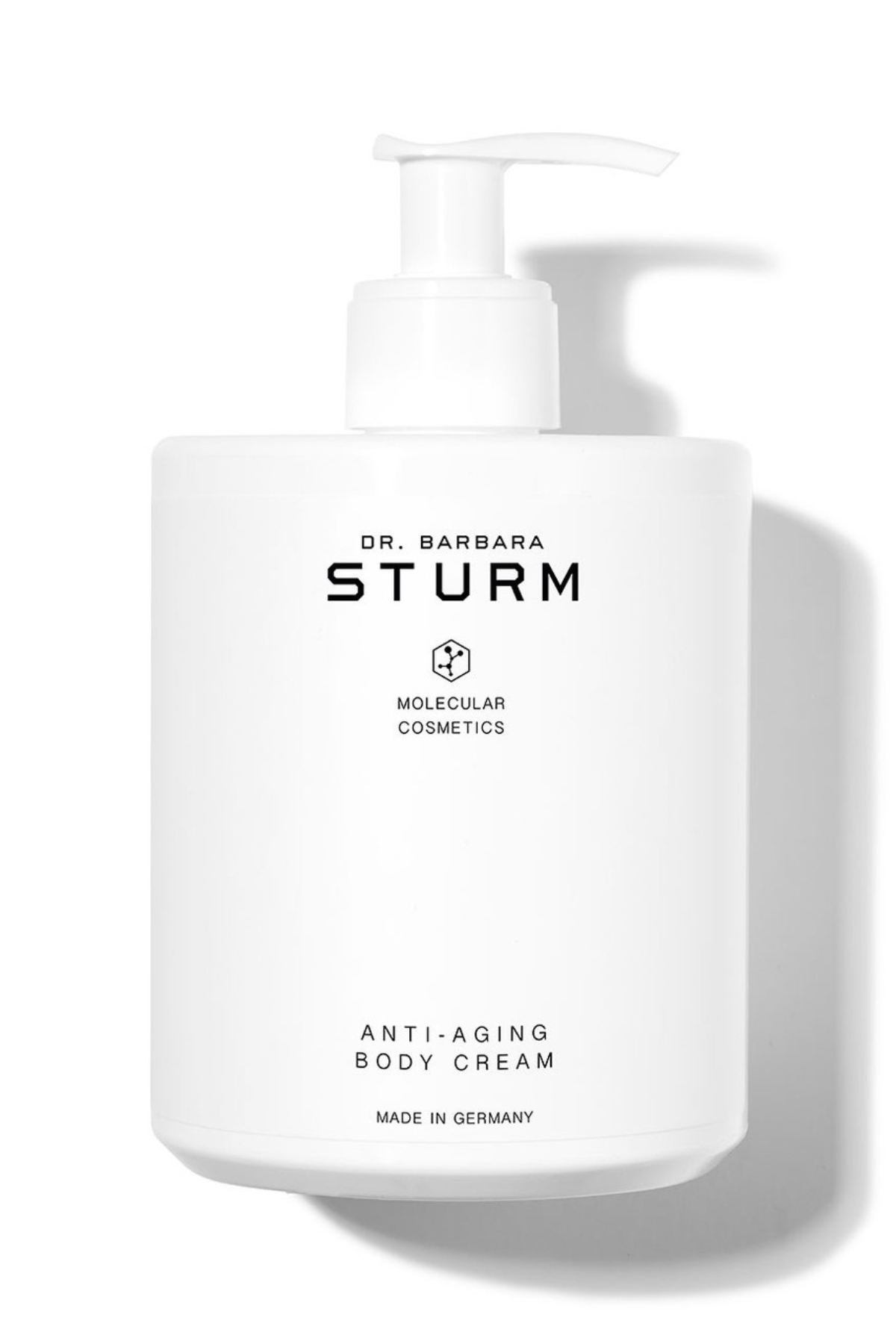
Dr. Barbara Sturm is yet another tried and true, fan-favorite brand that’s more than earned its glowing reputation. It took Dr. Sturm four years to develop this innovative formula, which is made with sensitive skin in mind. It includes extracts of elderberry blossom and white almond, which firm skin, along with essential oils, which moisturize skin and restore elasticity. On an even more luxurious note, the cream is infused with pure glacier water.
Size: 7 oz
Key Ingredients: Purslane extract (anti-inflammatory); Shea butter (soothing and nourishing); Indian almond (moisturizing)
What I Love: Good for sensitive skin; Large container
What I Don’t: Strong scent
Customer Review: "I love this lotion! I was searching for a skin cream that I could use specifically on my knee area to help tighten up the skin from sun damage. Only a few weeks of use and I can already see a difference! My skin is smoother, and the age wrinkles have softened! I will forever use this cream!" — Sephora
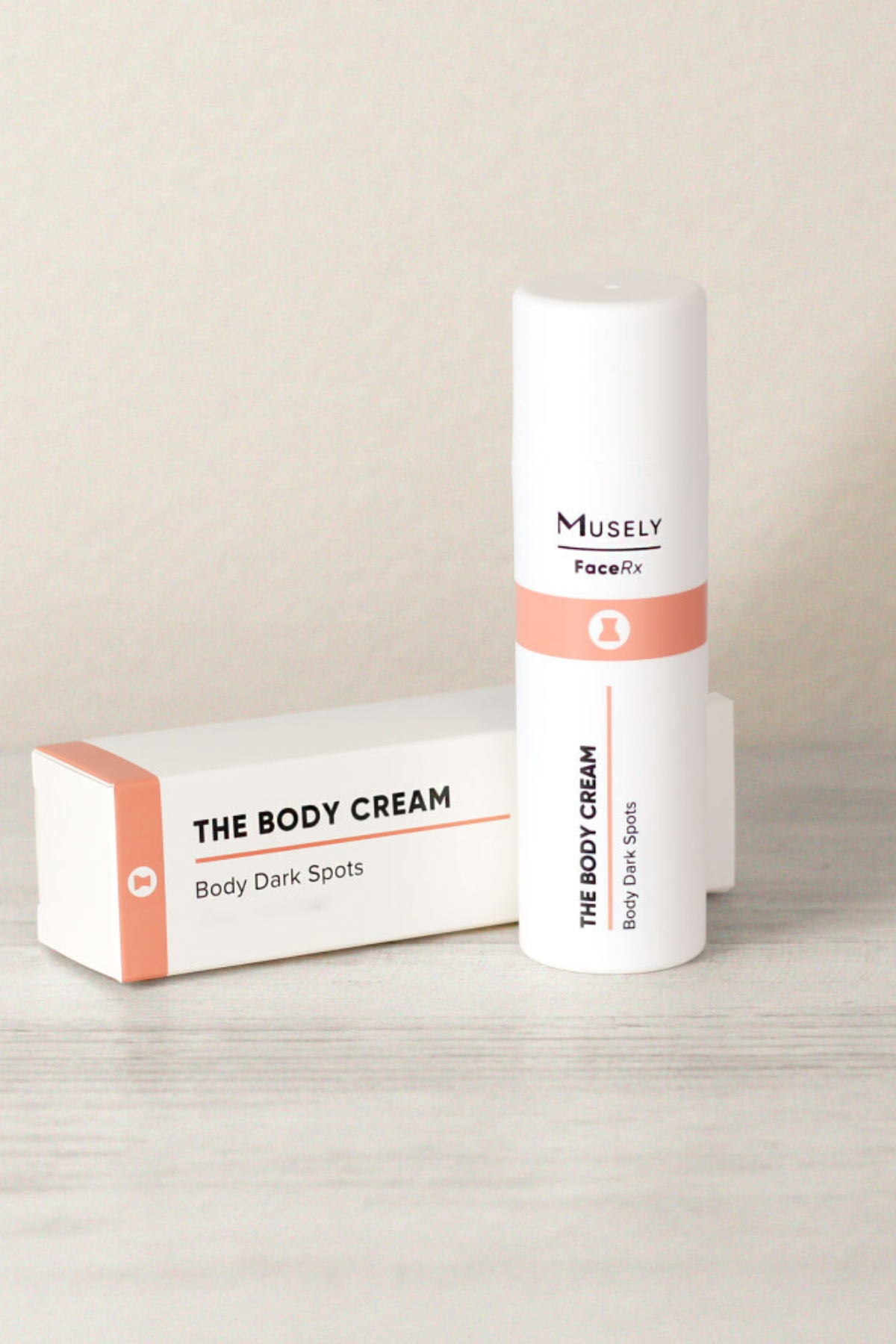
If you’re searching for prescription-strength skincare solutions but are currently between dermatologists, you’re in luck. Musely was founded to deliver customers prescription-strength results without actually having to visit a doctor. Developed by board-certified dermatologists, their body cream has been lauded by people of all ages for its ability to banish body acne, keratosis pilaris, wrinkles, and scars. Because it’s so potent, the brand recommends mixing it with a non-retinol, fragrance-free moisturizer when you’re starting.
Size: 1.7 fl oz
Key Ingredients: Glycolic acid (exfoliating); Vitamin C (brightening); Hydroquinone (dark spots)
What I Love: Created by dermatologists; Works for acne, scarring, and keratosis pilaris
What I Don’t: May be too potent for beginners
Customer Review: "The best product yet. I used to be afraid to wear short sleeves. Not anymore. This took YEARS off my arms. If you do anything this winter, do this." — Musely
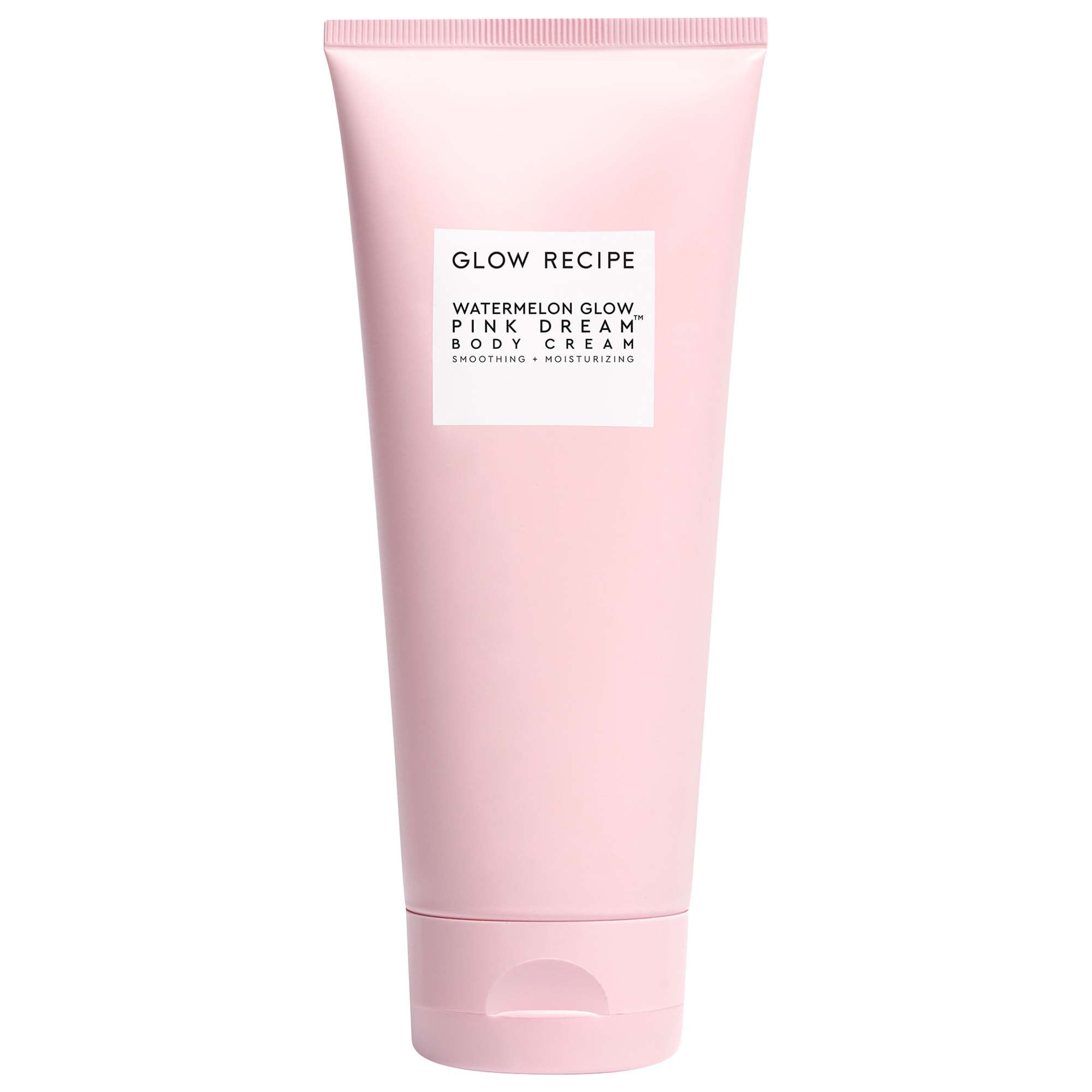
This retinol body lotion from Glow Recipe specifically targets uneven skin tone and texture, so it's great for mitigating issues like hyperpigmentation, melasma, scarring, and keratosis pilaris. While its retinol speeds up cell regeneration, ingredients like watermelon seed butter and hyaluronic acid ensure skin looks and feels hydrated.
Size: 6.7 fl oz
Key Ingredients: Watermelon seed butter (lightweight moisture); Hyaluronic acid (hydration); Hibiscus AHA (exfoliant)
What I Love: Hydrating; Clean at Sephora; Award-winning
What I Don’t: Sweet scent may be polarizing
Customer Review: "I received this cream as a sample when I purchased a bunch of Glow Recipe products, and I fell in love with it!! So much that I have decided to purchase the full size of it. The smell is subtle, but it smells like Hubba Bubba or some type of delicious bubble gum." — Sephora
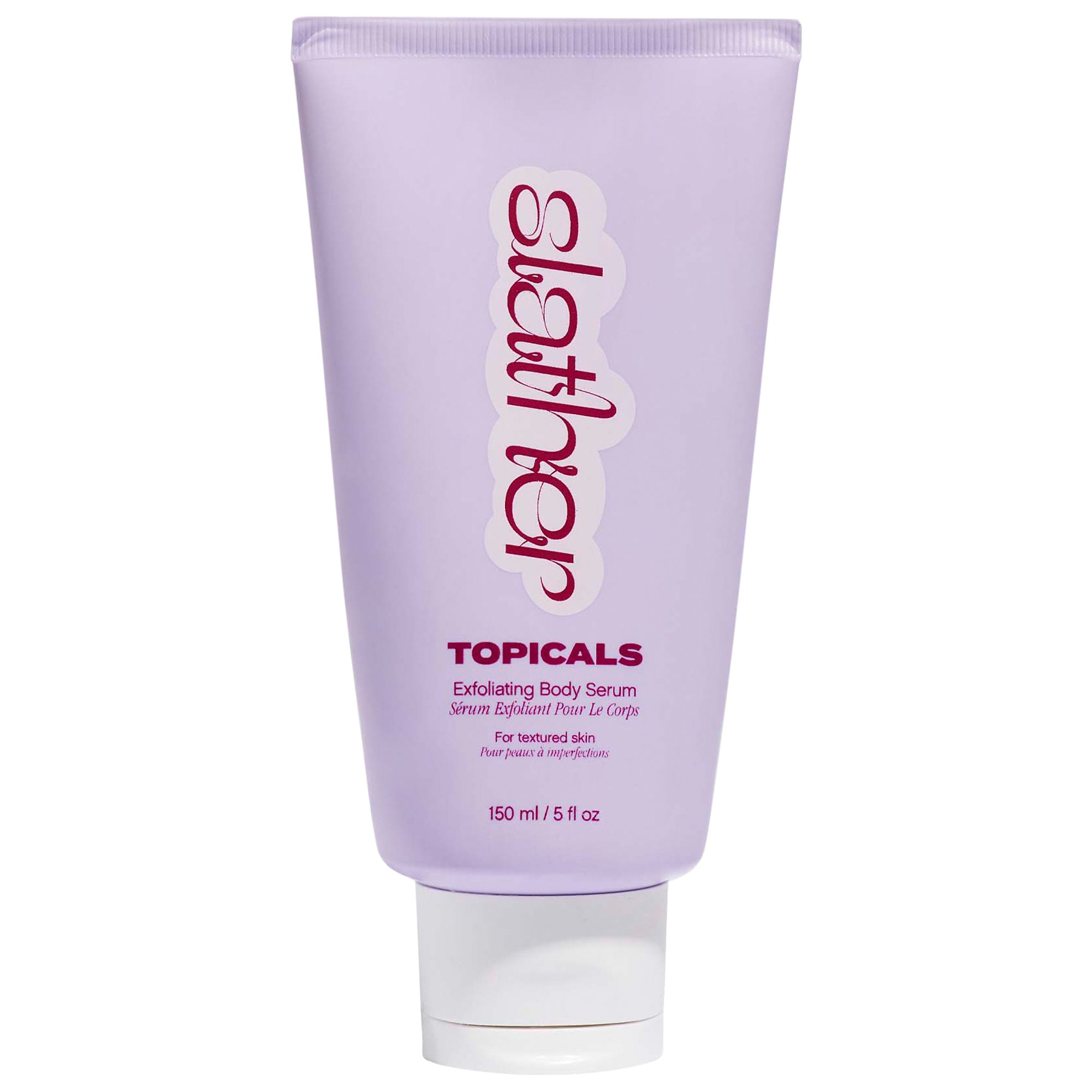
Skincare brand Topicals is known for the effective active ingredients it uses in its products. This lightweight body serum is a great example of this ethos, with its powerful formula of AHA, glycolic acid, and retinol. It's great to wear on its own or layered under a thicker, non-retinol lotion for extra hydration.
Size: 5 oz
Key Ingredients: Urea (hydration); Lactic Acid (exfoliate); Glycerin (hydration)
What I Love: Lightweight; Hydrating
What I Don’t: Some users say that the packaging is challenging to manage (a lot of formula comes out at once)
Customer Review: "Great product, you’ll see a change from the first use in the KP. It really works. I have used a lot of products for KP but this one is the only one that really works for that." — Sephora
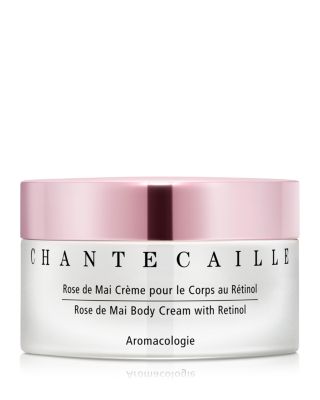
Why not add a bit of luxury to your daily skincare routine? This body lotion has a rich formula that both soothes and resurfaces. Its gentle scent makes it an even more indulgent sensory experience. As a restorative overnight treatment, it's especially recommended for those with sun damage and dry skin.
Size: 5.1 oz
Key Ingredients: Glycerin (hydration); Rose water (soothing and hydrating); Shea butter (soothing and nourishing)
What I Love: Lightweight formula; Gentle scent
What I Don’t: Unhygienic jar packaging
Customer Review: "Even before I finished a jar, I noticed the crepey skin under my arms were firmer. This body cream produces results and is worth every penny." — Chantecaille
The Benefits of Retinol
Dr. Shokeen loves a premium body retinol for its slew of benefits. "Retinol encourages cell turnover, helping cells to promote the emergence of new skin," she says. This helps reduce the appearance of fine lines and wrinkles." Regular use can lead to smoother skin, help fade dark spots and hyperpigmentation, prevent the clogging of pores, and potentially reduce the occurrence of body acne.
"Retinol has also been shown to stimulate collagen production, improving skin elasticity and firmness," says Dr. Camp. Retinol is also great for tightening crepiness and loose skin.
Where to Apply Retinol Body Lotion
"Retinol body lotion can be beneficial for any part of the body but is particularly effective on areas that show signs of aging or damage, such as the arms, legs, and décolletage," says Dr. Shokeen. "It’s also helpful on areas with rough skin texture or keratosis pilaris, such as the legs."
Dr. Camp adds, "The chest, shoulders, and back, which have a higher concentration of sebaceous glands and are more prone to sun exposure and sun damage, may benefit most from the retinol body lotions." Retinol body lotions can also be used on the hands, which are often overlooked.
What Concentration of Retinol Should I Use on My Body?
When choosing one retinol body lotion over another, you should keep concentration and potency in mind. "Start with a lower concentration of retinol and use it every other night," Dr. Penzi suggests. Generally speaking, the product should fall between .25 and one percent.
How Often Should I Use a Retinol Body Lotion?
Start using a retinol body lotion twice per week. "Gradually increase the frequency as your skin tolerates it. This helps your skin adjust to the retinol and reduces the risk of irritation," says Dr. Garshick. While all skin types can benefit from retinol, those with dry or sensitive skin may want to ease into it especially slowly. In a similar vein, Dr. Shokeen and Dr. Camp say that people with rosacea, eczema, dry skin, or expecting mothers should avoid retinol or should speak with a doctor before use.
"I recommend applying at nighttime, as retinol can make your skin sensitive to sunlight, and using it during the day may increase the risk of sunburn," says Dr. Penzi.
What Should I Avoid With a Retinol Body Lotion?
Because retinol increases the rate of cell turnover, you should avoid using it in tandem with acids like salicylic acid, glycolic acid, and azelaic acid, as well as with acne-fighting ingredients like benozyl peroxide. Rather, if you're looking for a retinol lotion that specifically targets acne, find one that incorporates anti-acne ingredients in delicate combinations and dosages approved by scientists and dermatologists.
You should also avoid applying retinol lotion on already fragile skin patches. Dr. Penzi, Dr. Garshick, Dr. Camp, and Dr. Shokeen all say users should avoid using retinol directly after shaving because razors create micro-abrasions on the skin and compromise the skin barrier, resulting in a temporarily hyper-sensitive environment.
Why Trust Marie Claire
For more than 30 years, Marie Claire has been an internationally recognized destination for news, fashion and beauty trends, investigative packages, and more. When it comes to the products Marie Claire recommends, we take your faith in us seriously. Every product that we feature comes personally recommended by a Marie Claire writer or editor, or by an expert we’ve spoken to firsthand.
How We Tested
For this story, I sourced consumer, dermatologist, and editor favorites and narrowed my testing pool to the best 17 formulas on the market. I evaluated each product based on qualifiers like ease of application, formula elegance, and efficacy.
Meet the Experts

Dr. Lauren Penzi, M.D., is a board-certified dermatologist based in New York state. A graduate of Loyola University Maryland and New York Medical College, she specializes in medical and cosmetic dermatology and is a member of the American Academy of Dermatology, the American Society for Dermatologic Surgery, the Society for Pediatric Dermatology, the American Society for Laser Medicine & Surgery, and the Women’s Dermatologic Society.

Marisa Garshick, M.D., F.A.A.D is a leading board-certified dermatologist serving patients throughout Manhattan, New York at MDCS Dermatology: Medical Dermatology & Cosmetic Surgery, as well as an assistant clinical professor of dermatology at Cornell New York Presbyterian Medical Center. Dr. Garshick provides a wide variety of cosmetic and medical procedures and services including treatments for acne, eczema, hyperhidrosis, moles, psoriasis, rosacea, signs of aging, skin cancer, skin tags, vitiligo, and wrinkles.
She completed her undergraduate education at Emory University and attended medical school at Tufts University School of Medicine, where she graduated with Research Honors and Alpha Omega Alpha. Dr. Garshick’s post-graduate training in dermatology began with an internship at Memorial Sloan Kettering Cancer Center. She completed her dermatology residency at Cornell’s New York Presbyterian Hospital, where she served as Chief Resident in Dermatology.

Dr. Divya Shokeen is a board-certified dermatologist. She has published a number of peer-reviewed articles on dermatology and dermatologic surgery, and is a member of the American Academy of Dermatology, American Society of Dermatologic Surgery, and Women’s Dermatology Society. She is currently based in Southern California.

Brendan Camp, M.D., is double board-certified in dermatology and dermatopathology and sees patients at MDCS Dermatology: Medical Dermatology & Cosmetic Surgery. Hie expertise is in managing medical conditions like acne, rosacea, eczema, warts, psoriasis, moles, and skin cancer, as well as cosmetic concerns and treatments with Botox, fillers, lasers, and other skin rejuvenation devices.
Dr. Camp graduated with honors from Cornell University, earning a degree in biochemistry. As a medical student at SUNY Upstate Medical University in Syracuse, he participated in a one-year epidemiology fellowship at the Centers for Disease Control and Prevention in Atlanta, Georgia, where he participated in viral outbreak investigations. He completed his internship in internal medicine at the University of Chicago and later completed additional residency training in dermatology at New York-Presbyterian Hospital/Weill Cornell Medical Center.
Dr. Camp is the author of several scientific articles that have been published in the Journal of the American Academy of Dermatology, the Journal of Cutaneous Pathology, and the Journal of Clinical Oncology. He has also presented at meetings of the American Academy of Dermatology, the American Society of Dermatopathology, and the Society for Investigative Dermatology.
Get exclusive access to fashion and beauty trends, hot-off-the-press celebrity news, and more.
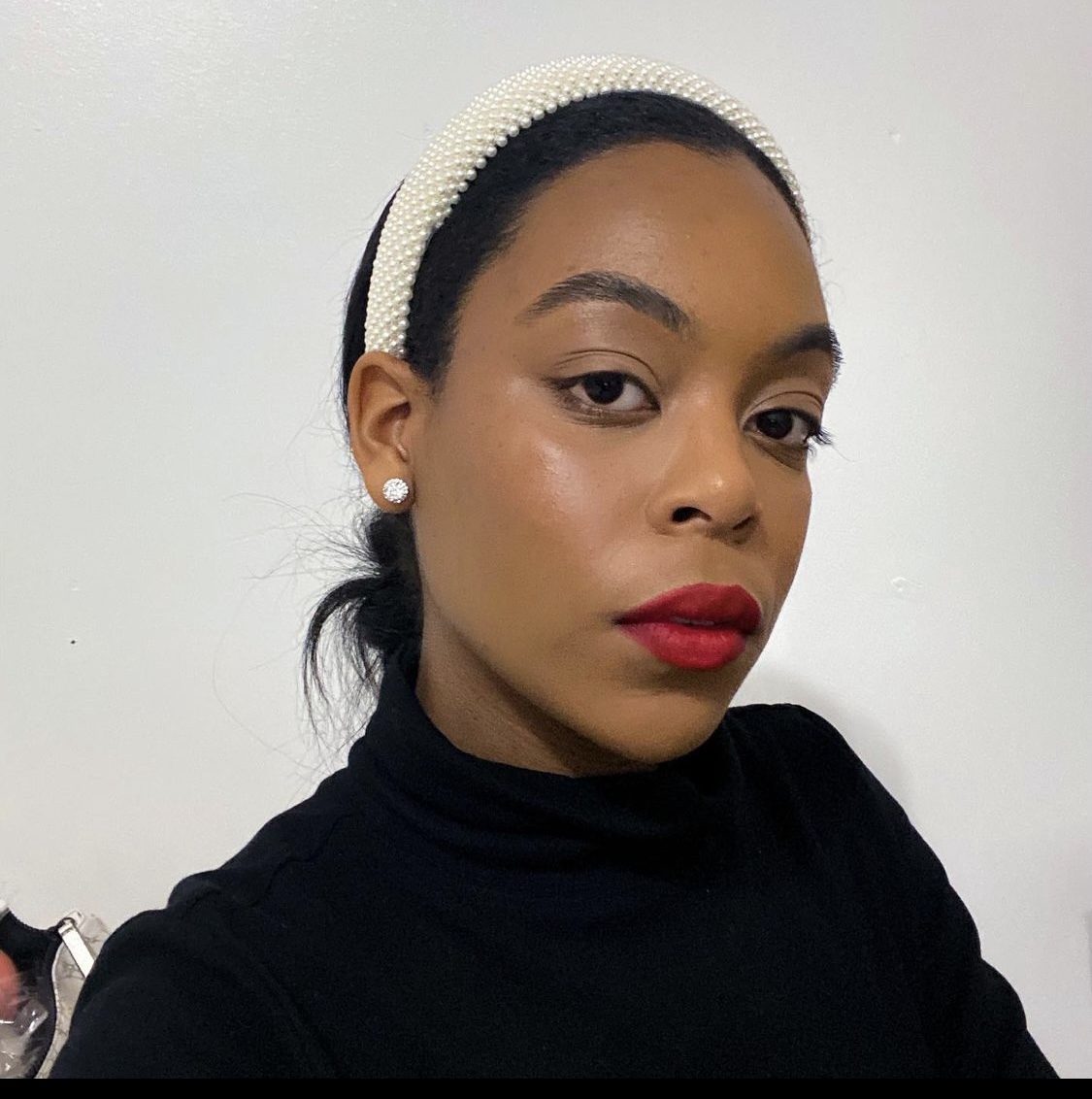
Ariel Baker is the Beauty Writer at Marie Claire. Previously the associate beauty editor at PS and briefly freelance, she has bylines in InStyle, Forbes Vetted, Women's Health, and more.
Since she started out in the non-profit sector, Ariel enjoys looking at beauty from a sociocultural lens, looking to avenues like politics, music, and the arts, to inform her views on the space. That being said, as a true beauty-product obsessive, testing the latest items to hit the market, keeping up with trends, and meeting industry icons, will always be her favorite part of working in the beauty space.
When she's not working, Ariel can be found hanging out with her fiancé and loving on their two cat daughters: Cow and Chicken.